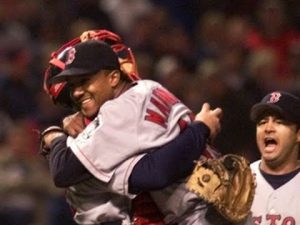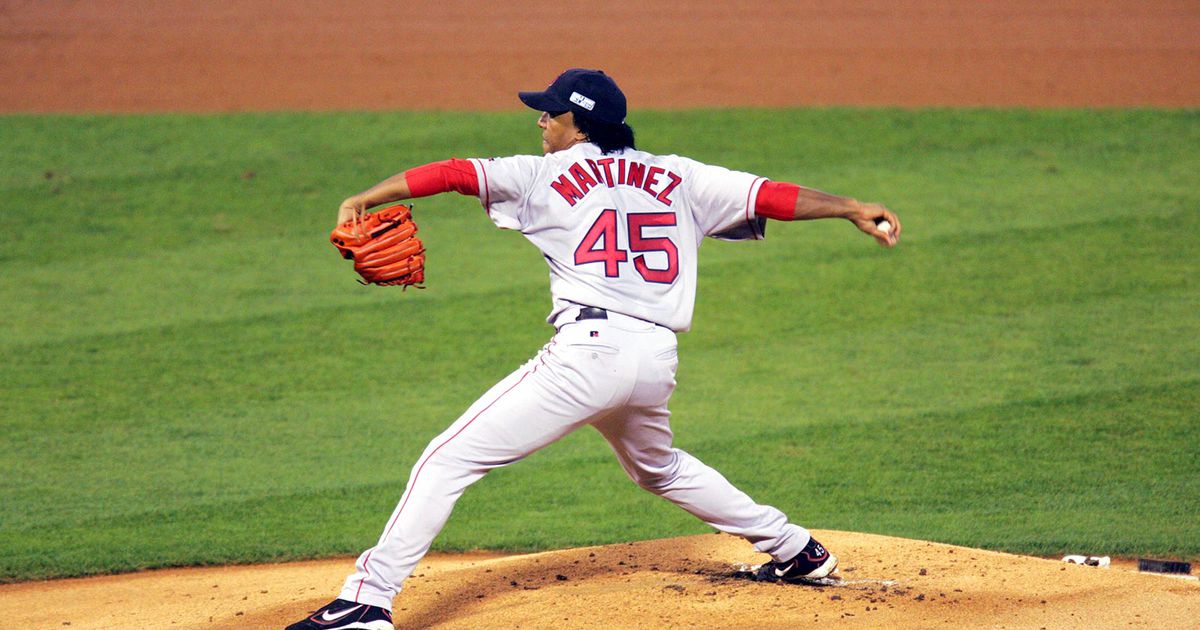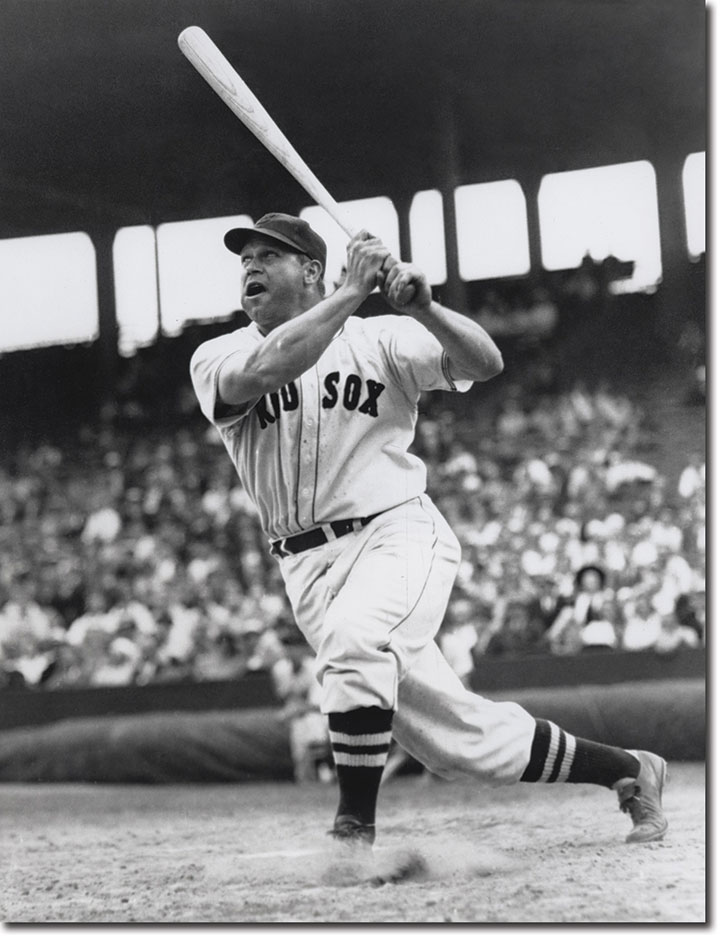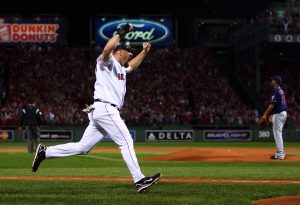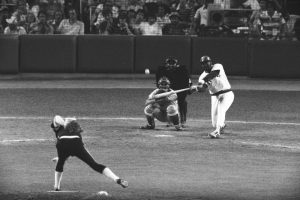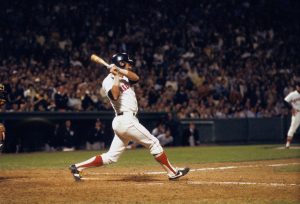The uniform numbers 41-45 feature another retired number from the Red Sox. Yes, 42 is retired, but that is for all of baseball, not a Red Sox retired number. The Red Sox’ 42 brought some serious clout to the plate though. The series continues and starts with a current Red Sox.
Number 41 – Chris Sale
Chris Sale has only been with the team for two years, but he has already accomplished so much. Most important, he was on the mound for the final out of the 2018 baseball season, striking out Manny Machado to clinch the World Series victory. Beyond that, Sale has struck out 545 batters over the two seasons, good for a whopping 13.2 batters per nine innings. He is 29-12 with a 2.56 ERA and 0.92 WHIP.
Sale had an excellent chance of taking home the Cy Young Award this season before he was placed on the disabled list and barely pitched over the final two months. He had 13.5 strike outs per nine and a 0.86 WHIP. It’s almost hard to believe he has yet to win a Cy Young and feels like only a matter of time. The Red Sox need to lock him up so he can keep adding to his Red Sox legacy.
Honorable Mentions: Dick Drago, Jeff Reardon, Victor Martinez
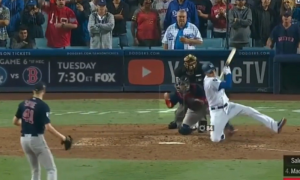
Chris Sale makes Manny Machado look foolish as he strikes him out to end the World Series.
Number 42 – Mo Vaughn
Without a doubt, “the Hit Dog” is the all-time best Red Sox player to wear number 42. Big Mo is from Connecticut and came up through the Red Sox farm system. After a couple Major League seasons finding his way, Mo broke out in 1993 and never stopped clubbing the ball. He hit 29 home runs and drove in 101 runs that season. His .297 batting average would be the last time he would hit under .300 as a Red Sox.
Vaughn hit .310 with a .984 OPS in the strike-shortened season of 1994. He then won his MVP Award in 1995, hitting 39 home runs and driving in an American League best 126 runners. His 1996 season was even better, batting .326/.420/.583/1.003 with 44 home runs and 143 runs batted in. Vaughn surpassed 200 hits for the first time that season, picking up 207. After a stellar 1997, Vaughn finished out his Red Sox career with another 200 hit season in 1998 while batting a career high .337. He hit 40 homers for the second time and posted a .993 OPS.
From 1995-98, Vaughn averaged 40 home runs and 120 runs batted in per season. His batting average was .320 during that time with a .986 OPS. Stretching those numbers out to 1994 only lessens them because of the strike, as his OPS would remain .986. Big Mo is a Red Sox legend.
Honorable Mention: Sonny Siebert
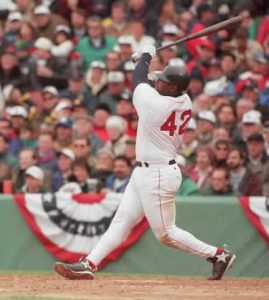
Number 43 – Dennis Eckersley
Before he was a lovable commentator for the team with all his funny sayings, Dennis Eckersley was a Hall of Fame pitcher. Eight of those seasons were spent in Boston. Eck was traded to the Red Sox before the 1978 season, when he enjoyed perhaps his finest season as a starting pitcher. Eckersley won 20 games that season, going 20-8 with a 2.99 ERA. He posted a 2.99 ERA again the following season, going 17-10.
The early eighties weren’t as kind to Eckersley, and he developed some bad habits which led to poorer performance on the field. He still had his use though, posting numbers worthy of a rotation spot for most of the time. Eckersley in fact made the All-Star Game in 1982, his first since his time in Cleveland. Over his first five seasons in Boston, he was 71-53 with a 3.56 ERA.
Eckersley returned to Boston for the final season of his career in 1998. He had a 4-1 record for the team in his final hurrah. Although his ERA was a little high, Eckersley pitched well for most of the season. Lit up in April, Eckersley settled down and had things straightened out by the middle of May. From May 11th onward he posted a 2.48 ERA
Honorable Mention: Alan Embree
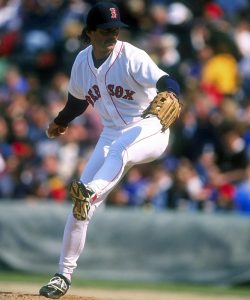
Number 44 – Jason Bay
There isn’t a lot of competition at the number 44. Gabe Kapler was a likable guy and won a World Series with the team, but he was a reserve outfielder. Orlando Cabrera was a key component to winning the 2004 World Series, but they let him walk at the end of the season. Danny Darwin had a couple nice years with the Red Sox, but also had a couple poor ones. Jason Bay gets my vote for his work over the final two months of the 2008 season and his excellent 2009 campaign.
Bay came to the Red Sox at the trade deadline in 2008 in a deal that swept Manny Ramirez out of town. He scored the winning run in the 12th inning of his first game with the team. The next day he homered and drove in three. Bay would hit nine home runs and post an .897 OPS over the season’s final two months. He then tore the cover off the ball in the postseason, homering three times and driving in nine runs. He batted .341 with an 1.105 OPS that October.
Bay got to play one full season with the Red Sox, and he made it count. Bay made the All-Star Game and won a Silver Slugger for his work as he bashed 36 home runs and drove in 119 runs. His .921 OPS was second on the team to Kevin Youkilis and he led the team in both home runs and RBI. He got a nice contract in the offseason from the Mets and never produced that much again, but that has no effect on his standing here.
Honorable Mentions: Danny Darwin, Gabe Kapler, Orlando Cabrera
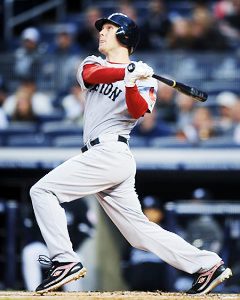
Number 45 – Pedro Martinez
Pedro Martinez is the greatest pitcher I have ever watched. Every game he pitched at Fenway was a can’t-miss event. He threw in the upper-nineties, had a wicked curveball and those weren’t even his best pitches. Pedro had a change-up that was described as unhittable even if the batter knew it was coming.
After a 1998 season that saw him win 19 games and place second in the Cy Young vote, Pedro went on perhaps the most dominant two year stretch in baseball history. Pitching in the height of the steroid era, in the American League East, Pedro was 41-10 with a 1.90 ERA, 0.83 WHIP, 12.5 strike outs per nine innings and 8.65 strike outs for every one batter walked. He led the league in ERA, WHIP and strike outs in both seasons and won the pitching triple crown in 1999.
His 2.07 ERA that season was even inflated by his post-All-Star break start. After dominating the All-Star Game in front of his home crowd, Pedro wasn’t right and was hit hard by the Marlins. After a disabled list stint, he was back to his dominant ways. His ERA was still almost a run and a half better than the second-place finisher. The next season his 1.74 ERA was almost two full runs better than Roger Clemens’ second place 3.70 ERA! He was unreal.
Pedro missed much of 2001 with injury, but returned to lead the league in ERA, WHIP and K/9 in each of the next two seasons. He was a combined 34-8 with a 2.24 ERA and 0.98 WHIP those years. In 2004, he accomplished his goal of winning the World Series in Boston. Pedro pitched seven shutout innings to win game three of the World Series. His number 45 is forever immortalized at Fenway Park.
